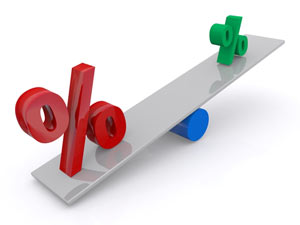Introduction to Pot Odds in Poker
 Poker is a game that is based on mathematics and odds. Every situation has a probability of various outcomes and if you understand the basics of the math behind things it will allow you to evaluate good situations and bad situations.
Poker is a game that is based on mathematics and odds. Every situation has a probability of various outcomes and if you understand the basics of the math behind things it will allow you to evaluate good situations and bad situations.
Successful poker play is somewhat based on knowing the odds. You may not be able to control the outcome of an individual situation however if you understand the odds of something actually happening you can compare that to the size of the pot you would win if it did and assess the risk to reward ratio.
If the pot odds offered are higher that the probability of you winning the hand then you are getting positive expected value situations and in the long term these situations will win you money. It is just this that makes poker a unique game and a game of skill not just chance.
Odds and Probability
Let’s say you have a fair coin and you make a bet with a friend. If it comes up tails, your friend gets $1. Then you manage to convince your friend that tails will come up twice as often as heads and so, he should give you $2 for every time heads comes up.
Of course, the reality is that heads will come up just as often as tails as there are only two possible outcomes and each has an equal probability of occuring, so even if he wins a dollar on the first, the first two or even the first ten flips, eventually you will have to come out ahead because you are winning twice as much on something that happens equally often. You are getting 2-to-1 pot odds on a 1-1 probability of a good outcome. Can you see how this is a good bet for you to be involved in?
Well this is the basic principle of poker pot odds, you assess the odds being offered to you by the pot and then assess the probability of you winning the hand. If it is a good bet for you to be involved in you should probably play, if not then wait for a better opportunity.
In other casino games like, say, roulette, the payout is always a little smaller than the odds of something happening. This is what creates the house edge and why although fun, most casino games with a house edge are a bad bet for the player involved as the odds are stacked in the casinos favour. In poker, on the other hand, you are in charge of finding the right spots.
How to Determine Poker Odds and Outs
Poker players win the same way, by getting opponents to give them longer odds than the true odds of something happening. Calculating the odds of winning a coin flip is easy. There are only two sides and therefore two possible outcomes and each outcome has an equal chance of happening.
Figuring out your odds of winning a poker hand is a little trickier since there are 52 cards and many different possible outcomes, but it can be done.
You need to determine your “outs” or in other words the number of cards that will give you a winning hand. To do this you will have to assess what you think your opponent is holding in order to understand what is required to win the hand.
For example if you have four suited cards to a flush and you know that you need to hit your fifth flush card to win the hand then you can work out how many cards are left that would fulfil that criteria. These cards are called outs in poker. In this situation we have 9 outs (13 cards in a suit less the 4 we have seen).
After the flop you have seen 5 cards, 2 in your hand and 3 on the board. This means there are 47 cards you haven’t seen (52 minus 5).
So with 9 outs to hit our flush then our odds would be 38-9 (38 cards lose, 9 cards win, total 47 cards available) or simplified about 4-1 (38 divided by 9).
If you have four outs to win, such as, for example needing a jack to complete a gutshot straight, you are 43-to-4 or about 11-to-1 to win.
If you have eight outs, such as, for example needing a seven or queen to make an open ended straight draw, you are 39-to-8, or about 5-to-1, and so on.
If you think you already have the winning hand, then the pot odds are irrelevant with respect to calling a bet because they are already in your favour; in fact, you should often raise to give your opponents bad odds to catch you.
Pot Odds in Poker
Now that you know the probability / odds of you winning the hand then the next step is figuring out the odds that you are being offered by the pot, this is also known as the pot odds in poker.
To do this you compare how much money is in the pot and how much money you have to risk in order to win the hand, so in other words the bet you are being asked to call.
For example If the pot is $90 and someone bets $6, there is now $96 in the pot. You are getting 16-to-1 pot odds on a call ($96 divided by $6).
Making your decision
So you now know the risk / reward ratio for the situation you are in. You have calculated the risk element by calculating the pot odds and you know the reward element with the odds of you winning the hand.
Now it is very simple to make a decision, if the level of risk (pot odds) is lower than the level of reward (odds of winning the hand) then it is a good situation to be involved in and vice versa.
For example for our flush draw, we are being offered 16-1 pot odds with having to call $6 into a $96 pot and our odds of hitting our flush and winning the hand is 4-1. The odds are massively in our favour and we should be playing this situation. To be profitable in the long term we only would need to win once for every 16 times we lost. Our odds are saying that we will win once for every 4 times we lose, so if we played this hand over and over again then we would come out with a massive profit.
Often margins are a lot finer than this example, but you can see how simple mathematics can make a difficult decision in poker quite straight forward and process driven.
Next in Series:
Section Navigation

Trust & Security
I'll only recommend Safe & Trusted sites with a proven track record
By Game Type
Different rooms are better for different game types & stakes
Beginner Friendly
I'll find you a site with players of a similar skill level
Promotions
I'll find you the best value Promotions, Bonus & Freebies!

 Return to the
Return to the 
